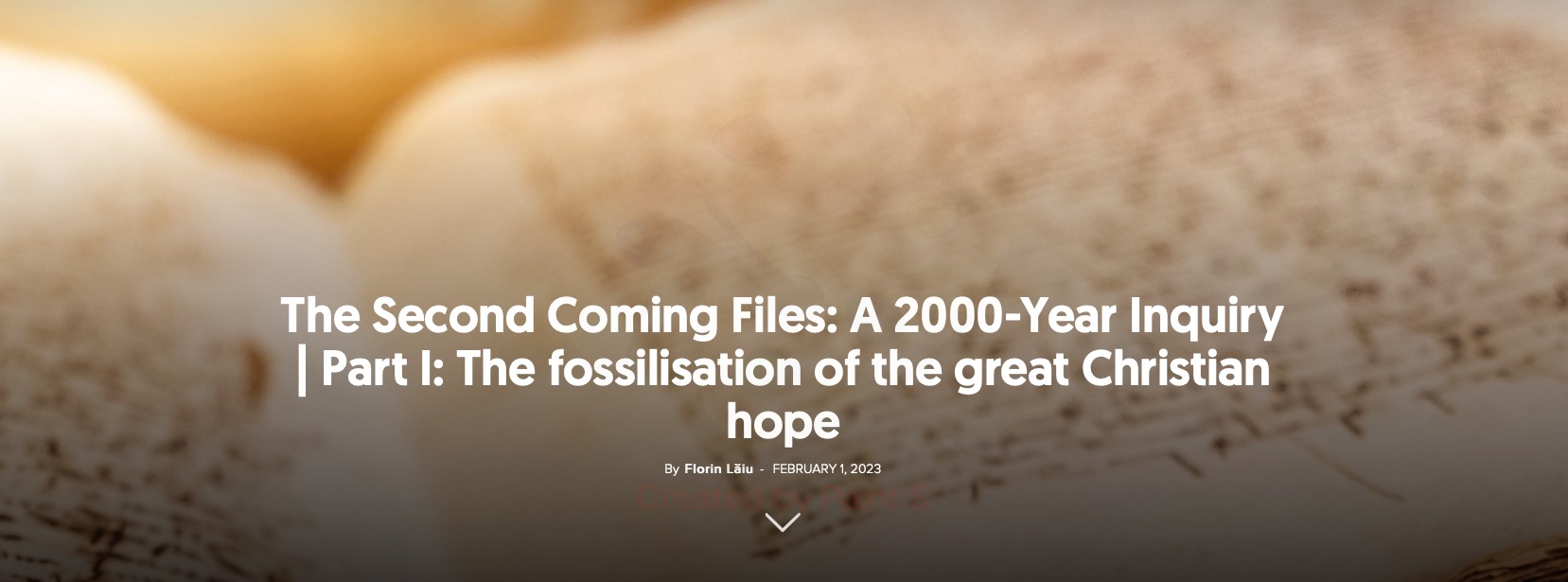The Second Coming of Jesus Christ is a cardinal doctrine of the Bible. Daniel, Revelation, and the eschatological passages in the Gospels are the main sources of Christian eschatology. The theological world is divided into several schools of interpretation, and eschatology remains fascinating because of the uncertainty it generates.
Throughout the history of Christian thought, the eschatological perspective has experienced periods of great interest, but also times when theological interest was focused on other areas, such as ecclesiology, Christology, and so on. The Christian church’s intense concern with the return of Jesus was greatly diminished when Augustine, in De Civitate Dei, interpreted the stone in Nebuchadnezzar’s dream reported in Daniel 2 as the church. In effect, Augustine diverted the attention of Christians from heaven to earth. As a result, in the view of Christians in the 4th century and beyond, eschatology was accomplished through the church.
The ad fontes principle[1] imposed by the Enlightenment created the context in which people rediscovered the desire for primary sources in both philosophical and theological fields. Theologians were no longer satisfied with the Latin translation, the Vulgate,[2] but turned to the Hebrew and Greek versions, the Masoretic text[3] and the Septuagint (LXX),[4] for their study of Scripture. During the Enlightenment, this new approach went beyond the gates of the universities. As such, dramatic changes occurred in the field of biblical hermeneutics. We thus see changes in Christian ecclesiology, soteriology, and eschatology.
Interest in eschatology, which began to flourish following the Protestant Reformation, culminated in the religious revival of the nineteenth century.
When and what?
One of the best known eschatological discourses of Jesus is the one on the Mount of Olives (Matthew 24, Mark 13, Luke 21). His announcement of the imminent destruction of the temple in Jerusalem prompted two questions from the disciples, demonstrating a concern common to every Jew: when and what. The first question involves an interest in time, and the second in the event that will herald the time of the parousia. These two questions are present in every eschatological study (collective and/or individual).
The disciples’ questions must be interpreted from their point of view, in which the future event of the destruction of the Temple in Jerusalem is linked to the end of the world. In Jewish thought, the moment of the destruction of the Temple meant nothing other than the end of the world. Therefore, the two questions are not to be interpreted as post-events, even if, from the perspective of the present reader, two separate events can be seen: the destruction of Jerusalem (past event) and the return of Christ (future event). This perspective was not within the interpretive scope of the disciples. Moreover, for the disciples the eschaton implied the re-establishment of Israel as a kingdom and the restoration of the greatness achieved in the time of the Davidic dynasty. As tributaries of official Jewish hermeneutics, the apostles had a perspective rooted in the political thinking of their time.
This is of particular importance. Readers of eschatology must be aware of their political, cultural, and hermeneutical conditioning in relation to their time.
As such, the interpretive principles must be well clarified, and no particular historical context should become a hermeneutical criterion in biblical eschatology. Admittedly, there are certain historical events that have prophetic connotations, but there are many others that need not be given this quality. To use the current meanings that we attach to certain events in an attempt to find the real meaning of Christ’s eschatological discourse is an approach that can lead to interpretations that are completely divorced from Jesus’ intended message.
Unfortunately, the disciples’ preoccupation with finding events associated with Christ’s return has, over the centuries, become the primary concern in eschatological study and discourse. This demonstrates the tendency of each generation to anchor eschatology in its own time, at the risk of negatively affecting spiritual life.
Watch out!
It is very interesting that Jesus begins His answer to the disciples’ questions with a warning: “Watch out that no one deceives you” (Matthew 24:4). The present tense of the verb blepõ implies permanent vigilance, which indicates the presence of a permanent danger, which can be divided into two categories: the danger of external factors (political, social, natural, and religious events) and the danger of internal factors (self-deception).
With regard to the danger of external factors, it is significant that the idea of eschatological deception appears three times in the passage of Matthew 24, and all of them refer to the action of false prophets. In fact, verse 5 begins with the justification of Christ’s warning: “For many will come in my name, claiming…”. The threefold appearance of this religious category has a very important meaning. The action of this category shows the attempt to anticipate the return of Jesus.
It is important to note that this category’s attempt to deceive the faithful is not due to an inadequate understanding of eschatological time. If that were the meaning, then most believers who study eschatology would fall into this category.
Jesus’ statement is quite clear: “[They] will deceive many” (Matthew 24:5); “many false prophets will appear and deceive many people” (Matthew 24:11); “false messiahs and false prophets will appear and perform great signs and wonders to deceive, if possible, even the elect” (Matthew 24:24). These passages suggest that the deception is a deliberate act, an attempt to distract the faithful from the hermeneutical model of Christ.
The discourse of false prophets and messiahs is not limited to religious elements. The interpretation of political, religious, social, and natural events through a personalised hermeneutic involves the emotional manipulation of people concerned with eschatology. Major events in the life of society have historically been seen as harbingers of the end. There are certain historical events that can be clearly placed in the prophetic realm, but most have no prophetic relevance. Those prone to the eschatological exploitation of mundane events with social implications demonstrate their vulnerability to false prophets.
Take heed to…yourself!
Self-deception is perhaps the most dangerous spiritual phenomenon. It is even more dangerous when it occurs in an eschatological context. The warning of Jesus to the disciples about apostasy suggests two main causes: persecution and the multiplication of lawlessness.
Periods of persecution of the Church were times of serious selection of Christians who loved God with all their being. The Greek term used by the apostle Matthew, scandalisthesontai, is a future passive verb, indicating that people will fall victim to deception that will lead to hatred and mutual betrayal. Fear is the element used by the persecutor to provoke people to renounce their faith.
The multiplication of lawlessness is another point Jesus makes in warning the disciples of the coming danger. Although the apostles were very concerned about knowing the when and the what, Jesus Christ says that love of God and neighbour is far more important than knowing the eschatological details.
Since Jesus warns of the extinction of love, it is important to understand that this phenomenon is directly caused by the increase of lawlessness, which is called anomia. The problem of the challenge to the moral law in the eschatological period takes on systemic dimensions. Given that Jesus speaks of the problems of believers, this means that this antinomian attitude is taking place at a systemic level within Christianity.
Another danger that Jesus speaks of in Luke 21:34 is the desensitisation of the human mind to spiritual values. The phrase used is “take heed to yourselves,” which indicates a diversification of potential deceivers. They are not only around us, they can be within us. In fact, the most subtle deceiver can be ourselves. Jesus presents two causes of spiritual desensitisation of the mind: (1) excess of food and drink and (2) the anxieties of life. The internal consequence is spiritual desensitisation and the external consequence is being taken by surprise on the day of the Second Coming.
When Christ speaks of “drunkenness and gluttony,” He is referring, on the one hand, to people’s preoccupation with the mundane, making it an end in itself, and, on the other hand, to the effects of a lifestyle of excess that renders a person’s mind incapable of spiritual discernment. Both issues are frequently addressed in biblical literature, demonstrating God’s concern about the disastrous effects of an intemperate character.
In speaking of worry, Jesus Christ reminds the disciples that it is very difficult for a Christian to flourish in a spiritually hostile world. Anyone who wants to live in obedience to God will suffer negative consequences to a greater or lesser extent. Concern for the necessities of a decent life is a legitimate spiritual thing. But exclusive preoccupation with these legitimate needs and extreme worry distracts the believer from eschatological realities.
From the perspective of human perception, excess in eating tends to receive less attention than worry. However, from the perspective of Jesus, both are equally reprehensible and harmful: both have a negative effect on the mind and body, both divert attention from the imminent return of Christ, both block a person’s energies so that they have no time for God, their fellow human beings or themselves.
In answer to the question of when, Jesus said, “about that day or hour no one knows, not even the angels in heaven, nor the Son, but only the Father” (Matthew 24:36). What is within everyone’s reach, however, is the preparation for Christ’s return.
Jesus’s warning, which is also the solution, is simple: Watch out! By recalling the story of Noah, Jesus points out that in the last days there will be a state of normality that will take many by surprise. This is why the theme of vigilance becomes fundamental to the eschatological discourse. It is less important to answer the question of when, because when “the sign of the Son of Man” will appear in heaven, it will be too late for personal preparation.
Several lessons emerge from Jesus’ answer: (1) it is not important for us to know the eschatological time; (2) caution is needed to avoid spiritual deceivers; (3) the subtlest deceiver is the self; (4) to be truly prepared we must be constantly vigilant.
The concern for personal evaluation in view of the eschatological events was missing from the disciples’ questions about when and what. Three questions should have been asked: (1) When will they take place? (2) What will be the sign of your coming? (3) How can we prepare ourselves for that time?




















